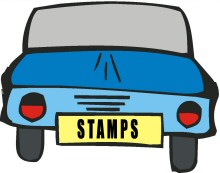
 |
The License Plate Game
By John M. Hotchner
 The task we have is to get people, both adults and children, as pumped up about stamp collecting as they get about the game of looking for license plates on a car trip. What are the attributes of the license plate game? A review might give us some clues about how we can better "sell" the hobby of stamp collecting.
The task we have is to get people, both adults and children, as pumped up about stamp collecting as they get about the game of looking for license plates on a car trip. What are the attributes of the license plate game? A review might give us some clues about how we can better "sell" the hobby of stamp collecting.
- There are a finite number of things to look for.
- Many are immediately available — maybe half can be found in an hour on the Interstate.
- Once that "investment" has been made, finding the rest becomes a challenge.
- Some will be very hard to find, but it is a real feeling of accomplishment when you do find them.
- The game can be done by one person or by a Group — or by a group with each person competing against each other.
- Though there is drive to be complete, there is no catastrophe if all 51 cannot be found in the time available.

- The game can be played over and over again. In fact what you learn about recognizing the plates as you play the game, helps when you play it again.
- Age of players makes very little difference. Young and old can play together or competitively with little advantage to the oldsters.
- There is a minimum of equipment needed.
- Done for the fun, and to pass time pleasurably, there need be no formal reward.
- It creates some excitement with very low stress.
- There is nothing beyond the game. When it is over, it's over. But generally it leaves a positive taste since in reality it is a win for all players. The real competition is against the 50 states (and District of Columbia) goal.
- If one starts with a country, there are a finite, read "manageable," number of stamps to search for. If one collects the world, the challenge is beyond imagining, but it is still manageable if the collector starts with a challenge of getting examples from every nation, or the stamps of the collector's birth year. In other words, start with something on which the collector can see real progress, and it is less likely that s/he will get overwhelmed and quit.
- Most stamps — almost always well more than 50% of the challenge — will be available at less than a dollar each; and most of those will cost less than 25¢, and will be most readily gotten in packets. But they will cost something, unless an adult mentor is willing to prime the pump with freebies.
- Once the collector has put together a collection that is perhaps 20% complete, and the collector has gotten familiar with the themes, and the panorama of stamps of a given country, there is a natural dynamic that kicks in that pushes toward filling more spaces in the album. But one key is that the collector has to do most of the work him or herself to gain that familiarity. A mentor cannot do it for the collector, however tempting it may be. The collector has to be free to gain the experience, including being free to make mistakes and to ruin some stamps through mishandling.
- It is not a bad thing that some stamps are beyond reach, and others will take saving and commitment. Stamp collecting, at its best, is a marathon, not a 100-yard dash. Looking forward to and savoring the special acquisitions is part of the fun.
- Stamp collecting can be a solitary and fulfilling hobby, but it is improved by communal enjoyment. Improved how? By helping each other with getting new acquisitions, with access to knowledge and introduction to resources, and with the companionship of other collectors who appreciate your challenges and what you have accomplished.
- This is not a hobby where the person who dies with the most toys or the fewest blank spaces in the album wins. No matter what The Competitive Philatelist says, the person who has had the most fun and enjoyment wins. It is often those left behind who win if the focus is on accumulating the greatest horde of value.
- Philately is ever new through new issues, new discoveries, new interests, and new knowledge gained. Thus it becomes boring only if the challenge is too narrow, and the cost of adding material to your collection is too great. It is the seeking that is the essence of the game; the progress that one makes toward overcoming the challenge. When it is overcome, it is time to look for a new challenge.
- Here is a problem. Oldsters tend to have the advantage of money and the knowledge of how to make contacts, and can use them to figure out the lay of the philatelic land. Younger folk need more help. But both will do better with one-on-one mentors.
- Stamp collecting does not need a lot of expensive support material to flourish; and though a beginner's album is a nice thing, it is easy to make one's own. The bigger problem is where to find what you need. The corner hobby shop is disappearing. So mail order and attending shows and bourses must substitute, and that often means the fledgling philatelist needs mentoring. See #8.
- The reward in philately is in the enjoyment of the time spent, and pride in the growing collection.
- Philately is — especially for adults — a welcome relief from the stresses and strains of the "musts" and "shoulds" of daily life.
- The philatelic game is, hopefully, a lot longer than the license plate game. The "player" follows a path that he or she individualizes and tailors for their own needs, so that the quest becomes fun, and a win for the collector.
Should you wish to comment on this editorial, or have questions or ideas you would like to have explored in a future column, please write to John Hotchner, VSC Contributor, P.O. Box 1125, Falls Church, VA 22041-0125, or email, putting "VSC" in the subject line, at jmhstamp@verizon.net
What do you think about lessons from long car trips? Join us in the message board and tell us about it.